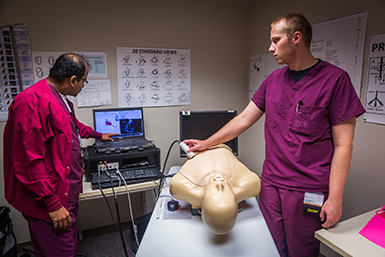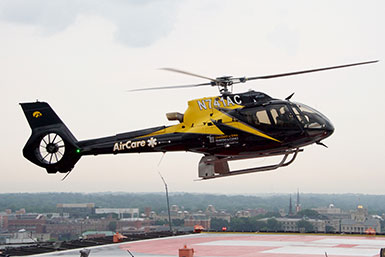EMCC Educational Curriculum
Overview
The Emergency Medicine Critical Care Fellowship offers a range of clinical, didactic, and research training opportunities.
Clinical critical care training is based in three intensive care units at the University of Iowa: the 36-bed Surgical and Neurosciences Intensive Care Unit, the 26-bed Medical Intensive Care Unit, and the 24-bed Cardiovascular Intensive Care Unit. Rotations are also available in other clinical units and services at the University of Iowa.
- Surgical and Neurosciences Intensive Care Unit (SNICU) – The 36-bed SNICU is the largest intensive care unit in Iowa. As an American College of Surgeons-designated Level 1 Trauma Center and a Joint Commission-accredited Comprehensive Stroke Center, the SNICU cares for patients with critical traumatic injuries, general surgery, neurosurgery, otolaryngology, transplant, neurology, and stroke patients. Residents from emergency medicine, anesthesia, general surgery, neurosurgery, neurology, family medicine, otolaryngology, orthopedic surgery, and oral surgery rotate through the SNICU.
- Medical Intensive Care Unit (MICU) – The 26-bed MICU is the largest medical ICU in Iowa, and it provides comprehensive medical care for critically ill medical patients. Emergency Medicine and Internal Medicine residents rotate through the MICU, and this unit manages most V-V ECMO for severe respiratory failure at the University of Iowa.
- Cardiovascular ICU – The 24-bed CVICU was opened in April 2014, and provides care for patients with acute coronary syndrome, heart failure, and surgical patients after cardiac, thoracic, and vascular surgery procedures. Two physician teams provide comprehensive critical care for patients with both medical and surgical emergencies. As the only Joint Commission-certified Ventricular Assist Device Program in Iowa, patients are treated with a variety of mechanical cardiovascular support devices.
Curriculum
The comprehensive 24-month curriculum has been designed to provide fellows the most broad exposure to multidisciplinary critical care. The program was approved by the American Board of Anesthesiology to qualify graduates for board certification in the Anesthesiology Critical Care pathway through the American Board of Emergency Medicine.
The curriculum is arranged in 13 4-week blocks each year.
| Year 1 (13 blocks) | Number of Weeks |
| Surgical Critical Care (within Surgical and Neuro ICU) | 12 weeks |
| Cardiothoracic Critical Care (Surgical) | 4 weeks |
| Neurological Critical Care (within Surgical and Neuro ICU) | 8 weeks |
| Medical Critical Care | 8 weeks |
| Surgical Selective | 8 weeks |
| Cardiothoracic Surgery and Cardiac Anesthesiology | 3 weeks |
| Fiberoptic Bronchoscopy and Chest Procedures, ICU Nutrition | 3 weeks |
| Clinical Electives/Research | 3 weeks |
| Vacation | 3 weeks |
| Year 2 (13 blocks) | |
| Surgical Critical Care (within Surgical and Neuro ICU) | 12 weeks |
| Cardiothoracic Critical Care (Surgical) | 8 weeks |
| Neurological Critical Care (within Surgical and Neuro ICU) | 4 weeks |
| Medical Critical Care | 8 weeks |
| Cardiac Critical Care | 3 weeks |
| Critical Care Selective (SNICU, MICU, PICU) | 4 weeks |
| Clinical Electives/Research | 10 weeks |
| Vacation | 3 weeks |
Available Clinical Electives (not exclusive):
- Advanced echocardiography (including transthoracic echocardiography)
- Advanced inpatient trauma care
- Burn Surgery
- Extracorporeal life support (ECMO)
- Nutrition
- Pediatric critical care
- Pharmcology (with clinical pharmacists)
- Renal and hemodialysis medicine
- Rehabilitation medicine
- Transplant medicine (solid organ/bone marrow)
- Research
- Other rotations at discretion of program director
- Optional longitudinal electives
Fellows will participate in clinical and call activities in accordance with the ICU to which they are assigned. Fellows will have a co-supervisory role for residents and medical students assigned to ICUs in which they are rotating, and are expected to participate in resident and medical student teaching activities.
Fellows will be evaluated monthly by their supervising faculty using an online evaluation tool, and biannual summative evaluations with the program director will review ongoing progress toward preparation for independent critical care practice.
Education and Conferences
A wide variety of critical care didactic curricula are available for critical care trainees. Both medical and surgical ICUs have weekly didactic programs, and fellows are encouraged to participate in the didactic training of the unit where they are working. Didactic training covers the breadth of medical and surgical critical illness, journal clubs and evidence based-medicine, and case conferences and presentations. Fellows participate in a reading program with asynchronous resources available to supplement their critical care didactic program. Fellows are required to present cases and lectures in conferences.
Fellows are required to participate in two non-clinical projects during their fellowship: a scholarly activity and a quality improvement project. The academic project could be comprised of original research, writing, review articles or book chapters, or another contribution to the development or dissemination of critical care knowledge. The quality improvement initiative will take the trainee through the plan-do-study-act methodology of quality improvement to learn the methods of continuous improvement in large complex organizations.
Fellows have $2400/year in academic funds that can be used for conference travel, professional memberships, books, and other educational resources to supplement the educational program.
Teaching
One important aspect of development as a clinician-educator is learning how to teach effectively. Intensivists in academic practice clearly have a teaching component of their career, but community intensivists also fill an important niche in teaching nursing staff, allied health professionals, and colleagues. Fellows will refine their teaching activities through resident and medical student clinical teaching. In addition, the College of Medicine’s Office for Consultation and Research in Medical Education and the Fellows as Clinician Educators programs both support advanced training in clinical teaching.
Research
Faculty members at the University of Iowa are engaged in clinical, basic science, health services, and educational research. The Institute for Clinical and Translational Science is a resource for faculty and fellows pursuing research interests. A variety of ongoing projects are available for fellows to learn research methods, or fellows can create their own research project. Regular clinical release time is available for fellows to pursue academic activities, including research, writing, curriculum development, and other academic activities upon approval by the program director.
EMCC Fellowship Longitudinal Electives
The critical care fellowship has established a series of optional longitudinal electives as part of the curriculum. While these are not required, these curriculum tracks offer the fellow more in-depth experience for developing additional qualification, certification, or competence during the critical care fellowship. These longitudinal electives will consist of dedicated month(s) of elective, in addition to a sustained exposure to the topic of interest during a 6-month period of the fellowship. The currently available tracks are listed below:
Extracorporeal life support
This elective consists of a 1-week course in extracorporeal life support management, followed by 2 weeks of dedicated time learning from the ECMO physicians and specialists. Following the dedicated 3-week elective, the fellow will take call with the ECMO team and round on ECMO patients in the cardiovascular ICU (venoarterial ECMO) and the medical ICU (venovenous ECMO).
Transthoracic echocardiography
This elective consists of an introduction to cardiac echo, followed by 2 months of  dedicated rotations in the echocardiography laboratory. During these rotations, fellows will be performing formal echocardiograms (in both critically ill and non-critically ill patients and interpreting echocardiograms with cardiologists specializing in echo interpretation. After the elective time, fellows will spend some afternoons on other rotations performing and interpreting echocardiograms, with the goal of 300 echo interpretations and 150 supervised echocardiograms. At the conclusion of this 6-month experience, the fellow will have sufficient training and experience to sit for the American Board of Echocardiography Transthoracic Echocardiography Board exam, and would qualify for Testamur status on successfully passing the examination.
dedicated rotations in the echocardiography laboratory. During these rotations, fellows will be performing formal echocardiograms (in both critically ill and non-critically ill patients and interpreting echocardiograms with cardiologists specializing in echo interpretation. After the elective time, fellows will spend some afternoons on other rotations performing and interpreting echocardiograms, with the goal of 300 echo interpretations and 150 supervised echocardiograms. At the conclusion of this 6-month experience, the fellow will have sufficient training and experience to sit for the American Board of Echocardiography Transthoracic Echocardiography Board exam, and would qualify for Testamur status on successfully passing the examination.
Percutaneous dilatational tracheostomy
This elective consists of a dedicated 2-day course in percutaneous tracheostomy placement, followed by structured meetings with the acute care surgeons who perform bedside percutaneous tracheostomy at the University of Iowa. After the didactic portion of this rotation, fellows will observe 5 tracheostomy procedures, then will perform 15 percutaneous tracheostomy procedures with graded levels of responsibility (consistent with training requirements recommended by American College of Chest Physicians and American Thoracic Society).
Inter-hospital transfer
This elective starts with a one-month EMS experience incorporating air transport,  ground transport, EMS education, and EMS administration components. Fellows will fly on AirCare, the University of Iowa helicopter aeromedical transport service. They will provide direct clinical care during their shifts, and they will have a didactic and reading program focused on the administration of EMS services, especially for critically ill patients undergoing interfacility transfer. Over the remainder of a one-year experience, they will be scheduled for AirCare shifts and providing continuing prehospital provider education as well.
ground transport, EMS education, and EMS administration components. Fellows will fly on AirCare, the University of Iowa helicopter aeromedical transport service. They will provide direct clinical care during their shifts, and they will have a didactic and reading program focused on the administration of EMS services, especially for critically ill patients undergoing interfacility transfer. Over the remainder of a one-year experience, they will be scheduled for AirCare shifts and providing continuing prehospital provider education as well.